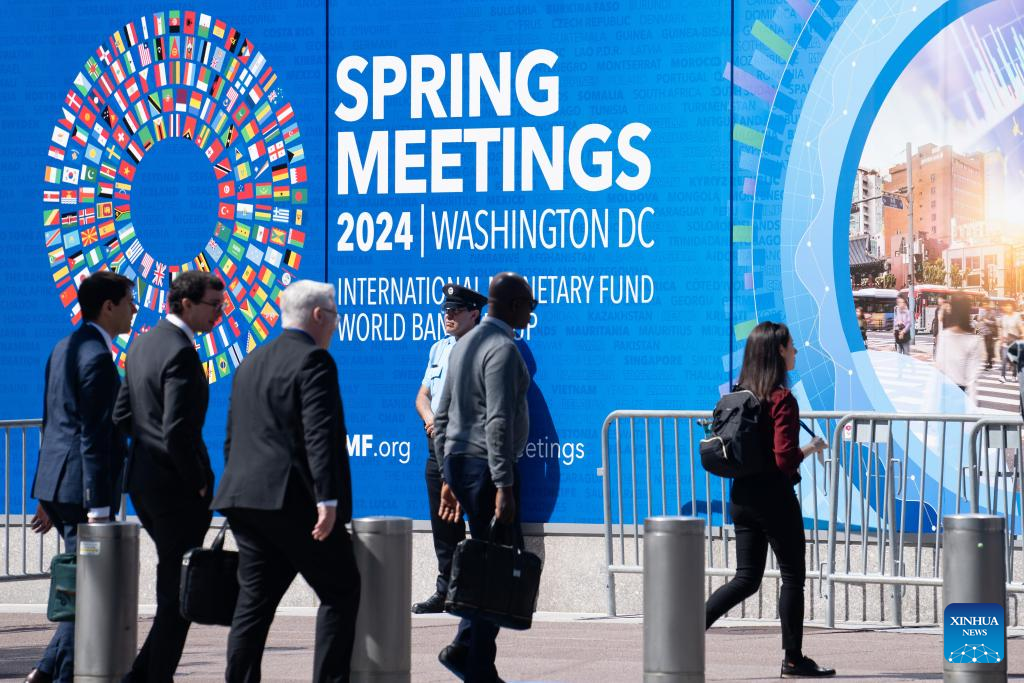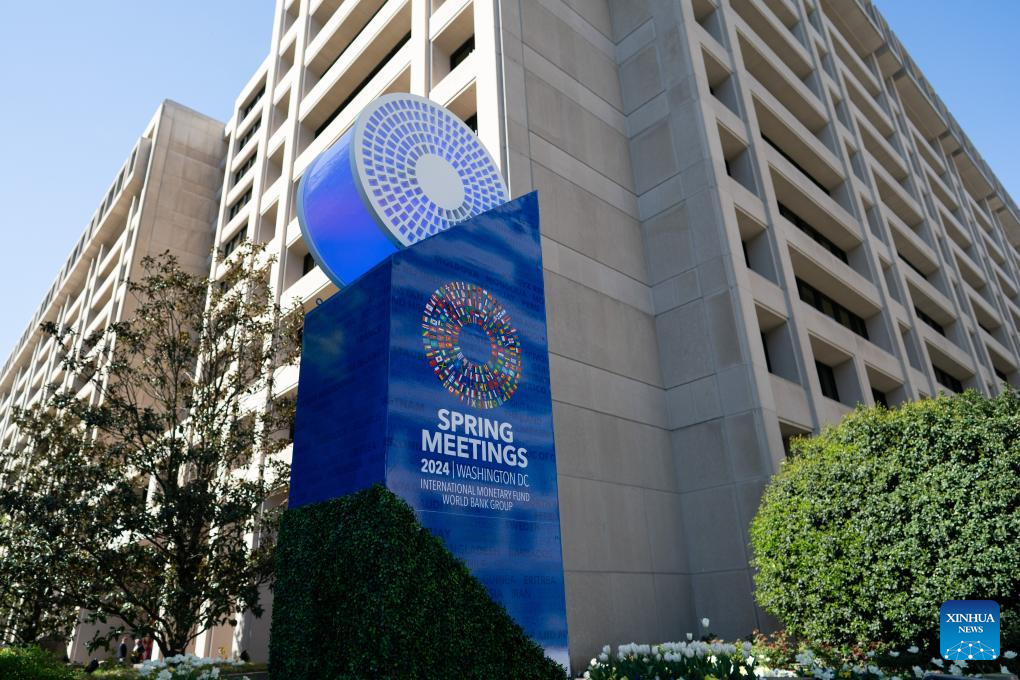
Pedestrians walk past the International Monetary Fund headquarters in Washington, D.C., the United States, April 16, 2024. The International Monetary Fund (IMF) on Tuesday upgraded its forecast of global growth in 2024 to 3.2 percent, 0.1 percentage points higher than its projection in January, according to its newly released World Economic Outlook (WEO) report. (Xinhua/Liu Jie)
WASHINGTON, April 16 (Xinhua) -- The International Monetary Fund (IMF) on Tuesday upgraded its forecast of global growth in 2024 to 3.2 percent, 0.1 percentage points higher than its projection in January, according to its newly released World Economic Outlook (WEO) report.
Despite gloomy predictions, the global economy remains remarkably resilient, with steady growth and inflation slowing almost as quickly as it rose, Pierre-Olivier Gourinchas, chief economist of the IMF and director of the Research Department, told a press briefing during the 2024 Spring Meetings of the IMF and the World Bank. "Most indicators continue to point to a soft landing."
Despite less economic scarring from the crises of the past four years, the IMF estimates that there will be more scarring for low-income developing countries, many of which are still struggling to turn the page from the pandemic and cost-of-living crises, he said.
The IMF expects advanced economies to grow 1.7 percent in 2024, up 0.2 percentage points from its January forecast. The U.S. economy will grow 2.7 percent in 2024 and slow to 1.9 percent in 2025. The eurozone economy will grow by 0.8 percent in 2024, accelerating to 1.5 percent in 2025.
"The strong recent performance of the United States reflects robust productivity and employment growth, but also strong demand in an economy that remains overheated. This calls for a cautious and gradual approach to easing by the Federal Reserve," said Gourinchas.
He noted that the U.S. fiscal stance, out of line with long-term fiscal sustainability, is of "particular concern." It raises short-term risks to the disinflation process, as well as longer-term fiscal and financial stability risks for the global economy, he said.
The IMF expects emerging market and developing economies to grow by 4.2 percent in 2024, up 0.1 percentage points from its January forecast. IMF forecasts show that China's economy will grow 4.6 percent in 2024.
Despite welcome developments, Gourinchas noted that numerous challenges remain, and decisive actions are needed.
The WEO report showed that the latest forecast for global growth five years from now -- at 3.1 percent -- is at its lowest in decades.
The IMF estimates that global headline inflation is expected to fall from an annual average of 6.8 percent in 2023 to 5.9 percent in 2024 and 4.5 percent in 2025, with advanced economies returning to their inflation targets sooner than emerging market and developing economies.
"While inflation trends are encouraging, we are not there yet. Somewhat worryingly, progress toward inflation targets has somewhat stalled since the beginning of the year," said Gourinchas.
The IMF chief economist pointed out that oil prices have been rising recently in part due to geopolitical tensions and services inflation remains stubbornly high.
The report pointed out several downside risks: new price spikes stemming from geopolitical tensions, including those from the Ukraine crisis and the Gaza-Israel conflict, could, along with persistent core inflation where labor markets are still tight, raise interest rate expectations and reduce asset prices.
A divergence in disinflation speeds among major economies could also cause currency movements that put financial sectors under pressure, the report said.
High interest rates could have greater cooling effects than envisaged as fixed-rate mortgages reset and households contend with high debt, causing financial stress, it added.
On policy path, the IMF said policymakers should prioritize measures that help preserve or even enhance the resilience of the global economy.
The first such priority is to rebuild fiscal buffers, Gourinchas said, noting that fiscal plans so far are insufficient and could be derailed further given the record number of elections this year.
The IMF chief economist said that medium-term growth prospects are harmed by rising geoeconomic fragmentation and the surge in trade restrictive and industrial policy measures.
He also noted that green transition requires major investments. Green investment has expanded at a healthy pace in advanced economies and China, he said, adding that the greatest effort must now be made by other emerging market and developing economies. ■

This photo taken on April 16, 2024 shows the International Monetary Fund headquarters in Washington, D.C., the United States. The International Monetary Fund (IMF) on Tuesday upgraded its forecast of global growth in 2024 to 3.2 percent, 0.1 percentage points higher than its projection in January, according to its newly released World Economic Outlook (WEO) report. (Xinhua/Liu Jie)



